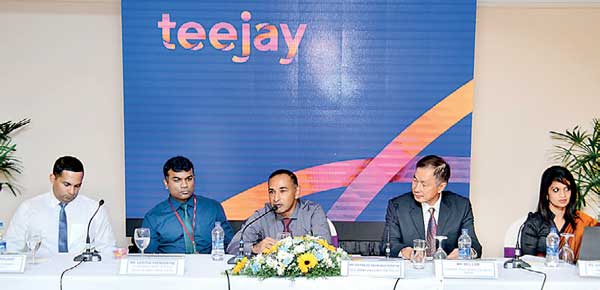Reply To:
Name - Reply Comment

Teejay Marketing and Business Development Chief Operating Officer Rodney Arland, Teejay Non-Executive Director and Brandix Lanka Ltd CFO Hasitha Premaratne, Teejay CEO Sriyan de Silva Wijeyeratne, Teejay Group Chairman Bill Lam and Teejay Corporate Communications Head Samadhi Weerakoon
By Zahara Zuhair Teejay Lanka PLC, the local weft knit textile manufacturing company, which was earlier known as Textured Jersey Lanka PLC, recently shared its latest business strategies, on which it intended to invest over US $ 35 million between 2015-2017. The company revealed that its biggest move would be the capacity expansion planned in India for next year with an investment of US $ 13 million. “So as we speak, the capacity is to double in two phases and we expect the first phase to be live and commercial early part of next calendar year.
It’s a very aggressive investment plan the team has put together with the support of the board,” Teejay CEO Sriyan de Silva Wijeyeratne told a media briefing held to announce its new corporate name.
Teejay Group Chairman Bill Lam said that there is a big market potential, particularly in India, which has one of the largest populations. “If you could penetrate the domestic market in India, sky is the limit. We are fully supportive of this investment,” he said. The company, which was initiated 16 years ago, expects to double the size in the next three to four years, aspiring to be a US $ 300 million company. Talking about their plans in Sri Lanka, Wijeyeratne said that they have plans to expand their synthetic capabilities and already have invested in digital printing. “For Sri Lanka, we are moving into the synthetic and value-added range as well as technology-based innovations. We recently commissioned synthetic manufacturing, one of the core needs of the industry for a long time. A very high percentage, close to 90 percent, synthetic fabric is imported into the country. Teejay has just started manufacturing synthetic in the country and that alone is a US $ 4 million investment,” he explained. “We have invested already in digital printing.
We spent about another US $ 3-4 million on modern technology, that is an ongoing commitment,” he added. With the aim of being the first Sri Lankan multinational brand in fabric and a household name in the entire apparel industry, under the new branding, the group brings three entities together, which will be named after Teejay Lanka, Teejay India and Teejay Prints. Coinciding with its debut as a new brand, the company also announced the launch of its new carbon neutral fabric range. Further, it was noted that they hold close to around 1/3 of market share in Sri Lanka. “When it comes to fabric, 47 percent is being currently manufactured in Sri Lanka and 53 percent is imported. Out of the 47 percent, we have roughly about 1/3,” the company said. Expressing thoughts on how GSP Plus would impact thee business, the officials said they have built solid foundations and would follow a different growth strategy. Meanwhile, with regard to the Economic and Technical Cooperation Agreement (ETCA), they said, as they are dealing with the export market, their business would not get fundamentally changed by the agreement. “You bring fabric duty free and some of those things won’t be drastically altered if the agreement comes in. But there will be knowledge sharing, people movement, access to Indian domestic market; these are some of the things Teejay can benefit from. On the other hand, we are establishing a footprint in India. For us, it is more about building a global footprint, rather than looking at trade agreements,” they said.
They expressed similar sentiments on dropping of the Trans-Pacific Partnership (TTP), which is to be ripped off by the future US administration. Talking about concessions offered on the budget last week, Teejay Non-Executive Director and Brandix Lanka Ltd CFO Hasitha Premaratne said, “Concession-wise there are two to three things that have come out. From a tax rate angle, our tax rate, which was 12 percent last year, now has been proposed to stay at 14 percent. So there will be a 2 percent impact if you look at it that way from what has been earlier in the legal system.” Apart from that, he said, there will be indirect benefits to the business, particularly the encouragement given to research and development (R&D), innovation-related activities to improve value-added exports. He also mentioned that as the products are predominantly exported through sea freight, the expansion of the southern part of the port has certainly helped to reduce vessel time in the last few years. “So, the time has come down to the European market as low as 11 days of shipping, while to the US it takes 17 days vessel time,” he said. According to the company, it has reported a net profit increase of 47 percent and a top line increase of 48 percent during the first half, marking nine continual quarters of profit growth for the company. The group is backed by Pacific Textiles, a Hong Kong-based company, and Brandix Lanka.